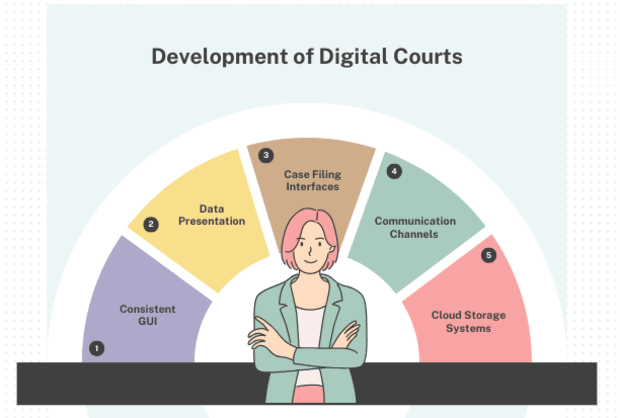Can India Make Digital e-Courts with Untrained Workforce?

Research Report: Decayed Digital Courts, Virtual Courts, e-Courts of India. By Rakesh Raman, Editor, RMN News Service
Can India Make Digital e-Courts with Untrained Workforce?
At present, the courts in India are using only some basic technology in their operations, and the development of real digital courts has not yet begun.
Research Report: Decayed Digital Courts, Virtual Courts, e-Courts of India
And
Need to Introduce Technology
Digital Courts | Virtual Courts | e-Courts
It is believed that the enhanced use of technology will reduce the pendency of court cases and improve the quality of justice. Therefore, the Supreme Court of India has directed all judges in high courts and lower courts to learn technology if they want to survive in the judicial profession. But the tech introduction plans exist only on papers while courts continue to work with obsolete processes.
DIGITAL INFRASTRUCTURE IN INDIAN COURTS
As part of the technology introduction drive, the top court has decided to provide video conferencing (VC) facilities in all 25 high courts to conduct hearings. According to a report of October 2023 in the Hindustan Times, the Supreme Court observes that knowledge of technology is a licence to become a judge as a person needs a licence to drive a car.
The Supreme Court warned the judges that their personal aversion to technology should not hamper the use of digital systems in courts. A bench, led by the Chief Justice of India D.Y. Chandrachud, told the judges that if they want to become a judge in India they need to be tech-friendly and have sufficient knowledge of technology.
The Supreme Court also directed the high courts to provide necessary infrastructure including internet facility to lawyers and litigants. The top court expressed its displeasure on the fact that many high courts have stopped using VC facilities and dumped their computer equipment while the Central government has sanctioned Rs. 7,210 crore for the third phase of the e-Courts mission.
The technology mission aims to augment the digital infrastructure in courts by setting up 2,500 new modern, virtual courts. The plans include the establishment of 1,150 virtual courts and 4,400 e-Sewa Kendras in all court complexes from where citizens – who do not understand technology – can access virtual courts, besides a range of online judicial services, including e-filing and e-payment of court fees.
Chief Justice Chandrachud informed that many Supreme Court judges are attending technology training sessions so that they could use technology in their judicial proceedings while the top court has started using digital platforms extensively.
The technology implementation project promises to provide efficient citizen-centric services as described in the e-Courts project Litigant’s Charter and deploy tech-based decision support systems in courts.
The objective of the project is to enhance judicial productivity – both qualitatively and quantitatively – so that the justice delivery system could be made affordable, accessible, cost effective, predictable, reliable, and transparent.
UNTRAINED WORKFORCE IN INDIAN COURTS
Unfortunately, however, the implementation of digital systems in courts is not picking up steam. Lawyers and judges keep using archaic procedures to handle court cases. In most cases, they openly defy the directions of the Supreme Court and do not allow litigants to use technology for communications.
Even at the National Legal Services Authority (NALSA), where the Chief Justice of India is the Patron-in-Chief, the officials arrogantly call people to court offices to discuss legal aid while this process can be easily accomplished digitally.
The negligible use of technology at NALSA and state legal services authorities is among the major reasons that the legal aid system has completely failed in India. The failure of the legal aid system has adversely affected hundreds of thousands of citizens who cannot afford the services of a lawyer or who belong to the vulnerable sections of society.
The lawyers refuse to interact with their clients on digital channels such as emails, WhatsApp, or video conferencing and judges force litigants to appear before them in physical brick-and-mortar courts. The litigants are not being provided the option to file digital documents, as lawyers and judges are not comfortable to read documents on computers.
The members of the judiciary fail to understand that the practice of using paper documents in courts leads to severe environmental damage. It also appears that the judges do not read the documents at all, and pronounce their judgments merely on the basis of crude arguments of lawyers in front of them – which is a defective way of handling court cases. The paper documents are collected only to keep them in physical records which are hardly checked.
It may be required to hold physical court hearings if the litigants, lawyers, or judges are not fully qualified to use technology. But the lawyers and litigants must always be given the option to use technology and digital communication channels during the entire lifecycle of a case.
Those who have knowledge of technology should be allowed to use courts digitally for all types of interactions and it should be made mandatory for ignorant lawyers and judges to learn technology within a specified period of time – say, three months. The technology usage should be part of the key responsibility areas (KRAs) of lawyers, judges, and court staff and they should be held accountable if they do not use technology and digital systems in their jobs.
At present, the courts in India are using only some basic technology in their operations, and the development of real digital courts has not yet begun.
RESEARCH REPORT
The 23-page PDF report on digital courts / virtual courts / e-Courts is given below.
You can also click here to download the report.
Contact
Rakesh Raman
Editor, RMN News Service [ Website ]
Founder, RMN Foundation [ Website ]
463, DPS Apts., Plot No. 16, Sector 4
Dwarka, Phase I, New Delhi 110 078, India
WhatsApp / Mobile: 9810319059














